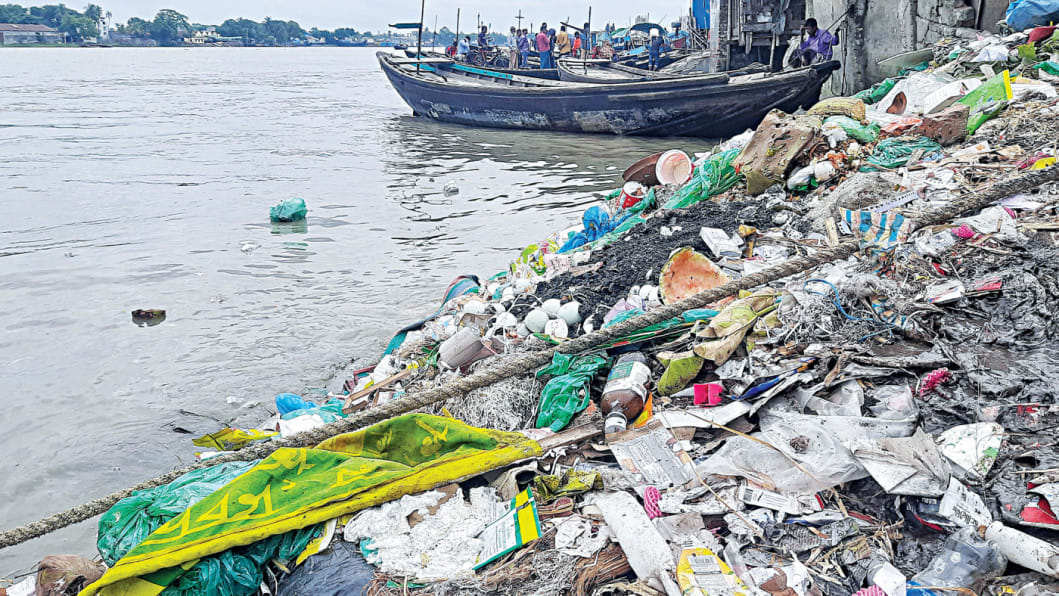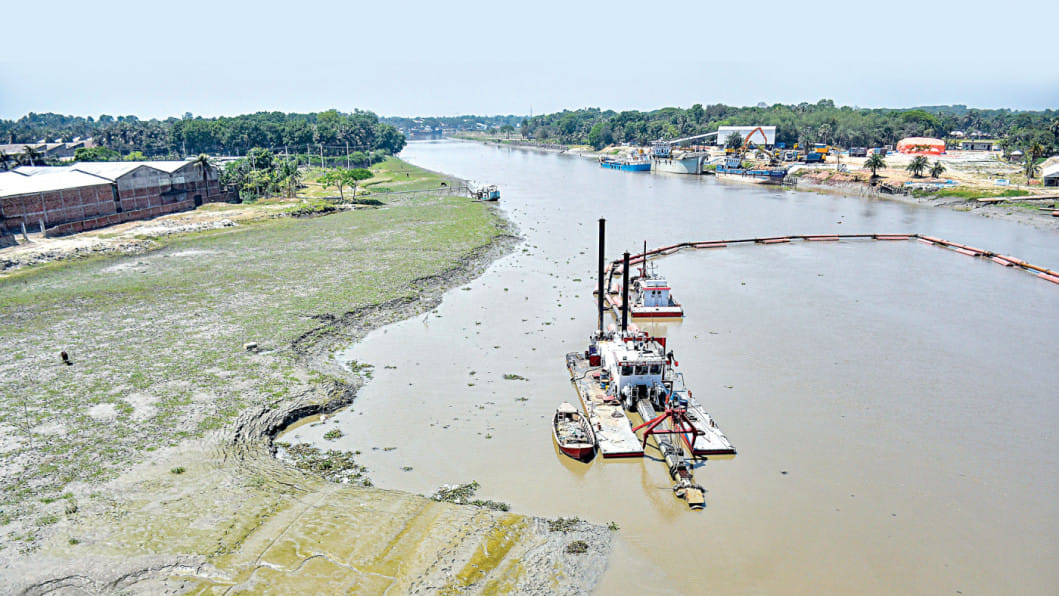Bhairab a lifeline under threat
WHY BHAIRAB MATTERS
- Bhairab is lifeline of Noapara, largest business hub in south-western region
- Imported goods like fertilisers, food grains and coal brought to Noapara through river
- 50,000 workers, families earning livelihood by engaging in activities centring Bhairab
ISSUES
- Encroachment and pollution
- Unplanned dredging, bridge construction works
- River now silted and losing navigability
RECOMMENDATIONS
- Planned dredging to improve navigability
- Evicting encroachers
- Strict measures by govt, awareness campaigns
The Bhairab river is gradually approaching its demise due to encroachment, pollution, and unplanned river dredging and bridge construction works.
Over the years, the river has shrunk significantly while losing its navigability.
Both sides of the river's 37-km stretch -- from Rupsha ghat in Khulna city to Noapara Bazar ghat in Jashore's Abhaynagar -- have fallen victim to encroachers, who are turning the river into a canal, according to environmentalists.
These grabbers have built business establishments, factories, and depots by the rivers while the authorities concerned continue to turn a blind eye, they alleged.
There are about 350 industrial units in the region. Among them, 230, including 54 jute mills, four power plants, soybean mills, 22 shrimp processing units and cement factories, are on the riverbank.

RAMPANT POLLUTION
According to officials, many government and private institutions depend on Bhairab for their shipments. Khulna Shipyard, BNS Titumir (Bangladesh Navy), BIWTA ghat, Forest ghat, Khulna Newsprint Mills, Khulna Hardboard Mills, nine state-owned jute mills, four power plants, three state-owned oil depots, and private jute mills have been built on the banks of Bhairab following due procedures.
However, waste generated from many legal and illegal establishments is being discharged directly into the river.
Besides, near the Khulna Boro Bazar, over a hundred toilets have been set up by the river.
Every day, over 300 cargo vessels carry goods and oil from Jashore's Noapara to different parts of the country along the river. On their way, they pollute the river by dumping waste and discharging chemicals, alleged locals and green activists.
They stressed the need for an awareness campaign and strict measures by the government to save the river.
Former professor Dilip Kumar Datta of Khulna University's environmental science department, who recently conducted a study on the quality of Bhairab's water, said, "Once the 160-km Bhairab used to be rich with aquatic life. However, industrialisation, unplanned urbanisation, increasing population, and dumping of waste are deteriorating its water quality.''
"It seems like we are adamant about killing our rivers. At least 20 large drains of Khulna City Corporation directly discharge liquid waste into Bhairab," he added.

ENCROACHMENT, NAVIGABILITY CRISIS HINDER TRADE
Bhairab is the lifeline of Noapara, the largest business hub in the country's southwestern region, which developed in the early 90s and flourished since then.
Noapara River Port was later established there in May 2007.
A large number of imported goods like fertilisers, food grains, and coal are brought to Noapara through the river on small ships from Chattogram and Mongla ports.
Imported goods worth around Tk 15,000 crore are cleared at Noapara port every year, with around 400-500 cargo ships docking at the port daily, said officials.
According to port sources, in 2022-23 FY, 6.92 lakh tonnes of goods arrived at the port through 1,584 ships, earning it a revenue of Tk 2.42 crore.
Around 35-40 percent of fertilisers imported to the country are unloaded at Noapara.
Visiting the area recently, it was seen that two-thirds of the Bhairab have been filled with silt for a two-kilometre stretch from Bengal Kheyaghat to Noapara Fish Bazar, Noapara Globe Ghat, and Taltala Ghat.
Also, around 40 illegal structures were seen encroaching on both sides of the river for a six-km stretch from Bhatpara to Mahakal cremation ground.
Hundreds of small and large cargo ships were seen stranded in the river, waiting for the tide.
"As the river is now shrinking and silted, and losing navigability, we are facing manifold problems carrying goods through the river," said Shah Jalal Hossain, general secretary of Noapara fertiliser, coal, and food grain traders' association.
"Earlier, it used to take 15 days to unload 1,000 tonnes of cargo, but now it takes around 25 days as these cargo ships often cannot anchor at the port due to a lack of water. Sometimes, small ships cannot even run in the water due to poor navigability," he added.
Mizanur Rahman Khan, an importer and former president of Jashore Chamber of Commerce and Industries, said, "It is necessary to dredge the river in a planned way to improve its navigability."
Falgun Mondal, general secretary of Noapara Handling Workers Union, said over 50,000 workers and their families are earning their livelihoods by engaging in activities centring the river.
"During the pandemic, 22 jetties were constructed in the river to mechanically unload goods from barges, cargo ships, and coasters instead of workers. These jetties were not removed later," he added.
Grabbers also installed cranes there to facilitate loading and unloading of goods from cargo vessels.
Iqbal Kabir Zahid, adviser of the Bhiarab River Sanskar Andalan Committee, said, "A total of 51 unplanned bridges and culverts have been constructed on the river, causing it to shrink."
"Meanwhile, grabbers are illegally occupying the dried-up river land," he added.
WHAT OFFICIALS SAY
Masud Parvez, deputy director of Noapara River Port, said 30 lakh cubic metres of dredging work was done across a 37-km stretch of the river last year at a cost of Tk 44 crore.
"The government earns around Tk 4 crore in revenue annually from the port. Steps are on to make it easier for traders to ship products, while drives will continue to evict the encroachers," he added.
Imdadul Haque, deputy director of Department of Environment, Khulna, said due to a workforce shortage, they cannot monitor all the industries properly.
"We are concerned about the issue and have conducted drives as well to free the river," he added.
Contacted, Ashraf Hossain, joint director (in-charge) of Khulna BIWTA, said they have identified many illegal structures and will take action accordingly.

 For all latest news, follow The Daily Star's Google News channel.
For all latest news, follow The Daily Star's Google News channel. 

Comments